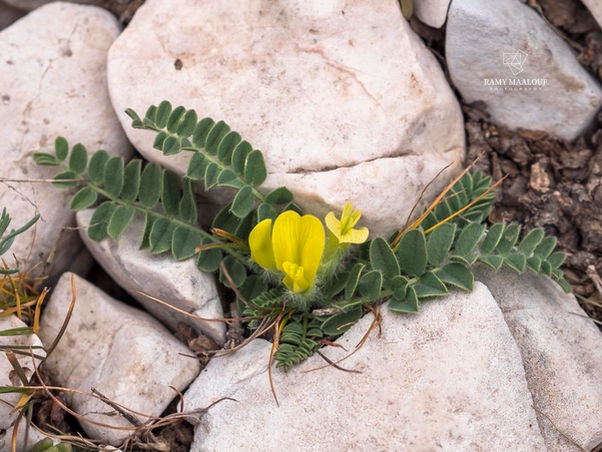Family |
Fabaceae
Astragalus nummularius subsp. trichopterus
(Boiss.) J.Thiébaut
Leb. Syr.
Astragalus nummularius subsp. trichopterus (Boiss.) Post
(Nouvelle Flore du Liban et de la Syrie, vol. 2, Pl. CXXXIII nº 4; 1983, as A. trichopterus)
Life-form & habit: Cushion-forming perennial with subterranean rhizomes and short aerial stems. Leaves spread flat on the ground in a dense mat, 5–10 cm long, surrounding few-flowered yellow racemes.
Leaves: Rachis filiform, ciliate, with 7–9 pairs of ovate, small, retuse leaflets, appressed-hispid on both surfaces. Stipules lanceolate, hirsute at the tip.
Inflorescence & flowers: Flowers subsessile, grouped into short racemes. Bracts ovate, shorter than the calyx.
Calyx: 10 mm long, sparsely hairy, with slightly unequal teeth about as long as the tube.
Corolla: Bright yellow, strongly exceeding the calyx; standard linear, retuse, glabrous, longer than the wings, which are often, though not always, ciliate-hispid at the margin.
Fruit: Not described.
Phenology: Flowers from June to July.
Habitat & elevation: Rocky slopes of high mountains.
Lebanese distribution: Mm. Tannourine, Ehden, Jourd Hasroun, Jabal Kneissé, Laqlouq; Me. Above the Cedars, Col des Cèdres, from Afqa to Yammouné, Dahr-el-Qodib to Berkacha, Jabal Sannine.
Syrian distribution: A.L. Manchoura, Harf Ram el-Kebch.
Native range: Endemic to Lebanon and Syria



